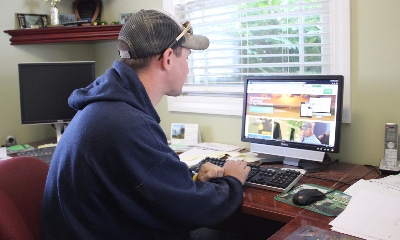
This summer the Missouri Department of Agriculture along with the University of Missouri Extension held listening sessions on the state of Missouri's farm economy. Farmers shared how they were making operational changes in order to keep the farm, that there was a need for better communication and education, and the future of agriculture needs help.

POURING OVER RECORDS: Farmers are looking more closely at ways to cut expenses in this tough farm economy. Some are reducing extra labor, while others look for off farm jobs to increase income.
Scott Brown, MU Assistant Extension Professor of Agricultural and Applied Economics, provided an overview of current and projected financial issues facing Missouri agriculture at each session. In the seven sessions held across the state, attendees had an opportunity to share any issues they see facing the agricultural sector, such as thoughts about credit, profitability, commodity prices and equity loss.
According to Darla Campbell, MU Extension agribusiness specialist, nearly 400 people including farmers, ranchers and community leaders, attended the meetings. She recently compiled the findings of the Missouri Farm Economy Listening Sessions.
Here are a few of the comments and recommendations she collected from Missouri farmers and ranchers who attended the sessions.
Producers are making adjustments
Farmers are not burying their head in the sand when it comes to the current farm economy. They are looking at ways to cut costs and improve the bottom line. Here are comments Campbell heard regarding operation changes during the sessions:
-Diversifying operations to reduce the effects of economic downfall by entering niche markets such as agritourism, organic production and farmers' markets
-Seeking programs that establish consumer trust such as the Agricultural Stewardship Assurance Program (ASAP).
-Seeking alternative solutions to keep their farms such as:
--working full-time/part-time off the farm
--completing custom hire work instead of hiring out
--avoiding equipment purchases and limiting inputs
--reevaluating family living costs
--focusing on strengths in operation
--knowing break-even points/recognizing the profit margin
--facing new challenges with technology
--and/or balancing higher yields and higher costs.
-Keeping up with ever-changing advances in technology.
Communicate with lenders, landlords
Today's tight margins have some farmers spending more time with loan officers and landlords. A common thread in the farm economy conversation was the need for better communication--not only talking, but also listening.
Here are a few ideas farmers had regarding relationships with lenders and landlords:
-Better communication is needed for low cash rent prices to landlords who don't understand after the high commodity prices seen in 2012-2014.
-Spend appropriately with lenders supervision; sensitive analyses help evaluate each situation.
-Make available credit at reasonable prices.
-Pay off debt when prices are high and times are good.
-Remember each financial situation is unique.
Challenges for young farmers
During the listening sessions, farmers voiced concerns for the next generation. And still some of the next generation expressed their own struggles. Here are their comments regarding young farmers starting out in Missouri:
-Considering 2012-2014 commodity prices being typical, the ability of young generations to return to family farms depends on the existence of Beginning Farmer Programs.
-Young producers struggle with down payments. This may be solved by established farmers investing without ownership in young producers' farms.
-Ultimately, encourage younger generations to return to the farm.
Education is the future
Farmers, ranchers and community leaders agreed that knowledge could bring about change and success in agriculture. However, it is more than providing learning opportunities for young farmers and ranchers. It is about helping those outside of agriculture--consumers and government leaders--understand what is at stake for Missouri farmers.
Campbell highlighted a few key messages farmers had regarding the need for education in farming's future.
-Establish agricultural education programs for county commissioners and other regional leaders.
-Establish farm finance continued education classes.
-Educate producers about state and federal loans, USDA-FSA and other federal program paper work, tax paperwork and efficient record keeping.
-Work to increase timely, unbiased information to share directly to producers.
-Bridge the knowledge gap between consumers and agriculture to reduce the challenges of expanding farms.
These comments and others will help the state and university focus programs to serve agriculture's needs in the future.
About the Author(s)
You May Also Like






